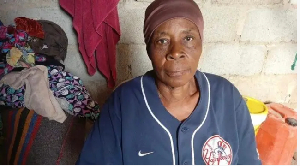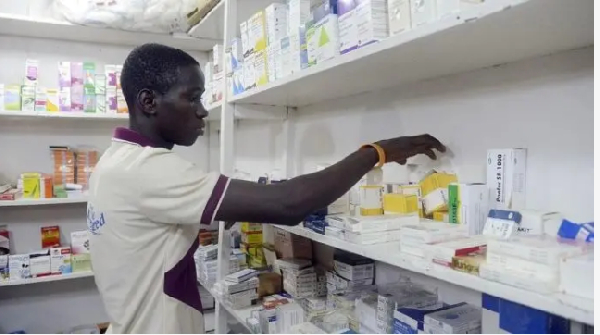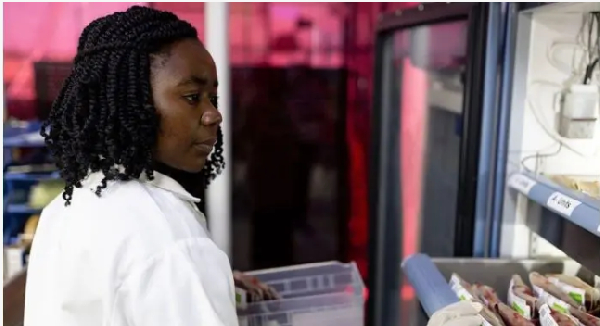 Rhoda Husseini, a single mother of two, no fit afford asthma drugs and so use traditional herbs
Rhoda Husseini, a single mother of two, no fit afford asthma drugs and so use traditional herbs
Di rising cost of regular drugs for Nigeria dey push medication out of di reach of many pipo as rem dey struggle wit di ongoing cost-of-living crisis.
Di prices of some regular drugs don double or triple in di last couple of months, wey make dem unaffordable for kontri wia over 60% of di population dey considered poor and survive on less dan $2 a day.
Nigerians also dey face rampant inflation wey hit 33.2% in March 2023, di highest rate in almost three decades. Costs also dey affected by di goment decision last year to remove fuel subsidies.
Nigeria Health minister, Muhammed Ali Pate tell di BBC say drug prices dey linked to unstable currency exchange rates wey don increase di cost of imported medicines.
Di minister also point at di low rate of enrollment for di kontri health insurance scheme wey don leave many to dey pay for drugs out-of-pocket, and dis further dey worsen di burden of rising costs.
Di goment don announce steps to address di spike in drug costs. Di Ministry of Health recently pledge to make am easier for local pharmaceutical companies to import ingredients and equipment to produce drugs locally.
However, e no dey clear how soon dis plans go dey implemented.
According to di World Health Organization (WHO), 95 percent of all medicines wey dem dey use for Africa dey imported.
Di continent account for just three percent of all medicine production globally, wit only Kenya, Nigeria and South Africa wey get big pharmaceutical industry.
Di Covid-19 pandemic highlight di need for local production.
In February, African leaders, led by di Africa Centres for Disease Control and Prevention (Africa CDC) agree on one initiative for African kontris to work togeda to buy medicines and vaccines in bulk, as e go allow dem to negotiate better prices.
Di initiative also aim to boost local manufacturing especially as dem dey make less dan one percent of life-saving vaccines in Africa.
Dis ambitious plan aim to increase local production to 60 percent by 2040.
'I use local herbs'
For now, Nigerians like Jane Aibangbe, a 29-year-old wey dey live for Lagos wey need regular medication, dey face danger becos of di skyrocketing costs.
Jane dey live wit systemic lupus erythematosus, a condition wey dey affect her immune system.
Di cost of her treatment don jump from 21,000 naira ($14/£10) in di last quarter of 2023 to 35,000 naira ($21/£17) in February 2024.
“I no dey happy but wetin I go do?” na so Jane, wey dey struggle to afford her medicine ask.
Just like Jane, 28-year-old Sarah Erekosima don dey live wit asthma for many years. Since drug prices increase, she dey forced to make lifestyle changes to ensure say she dey free of any asthmatic complications wey fit require urgent medication.
“I dey forced to drink warm water instead of cold water even under dis Lagos unbearable heat,” she tok of her efforts to prevent triggering asthma attack.
Di cost of her medication don rise from 9,000 naira ($6/£5) in May 2023 to over 67,000 naira ($42/£34) in March 2024.
“Of course, na my health, I wan live long, right? But e dey expensive,” she tok.
Like Sarah, Rhoda Husseini, anoda asthma sufferer from di town of Wamba, say she no fit afford di Ventolin inhaler wey use to provide her with instant relief.
“I no fit afford di inhaler and di tablets sometimes too no dey available. Now I dey use locally made traditional herbs” she tok, despite di fact say no evidence show say di traditional treatment dey effective.
Uche Tralagba, a doctor for Lagos say she dey concerned about how di spike in drug costs dey affect her patients.
“Some patients deliberately dey under-dose so di medications fit last longer” she tok.
“I also get some wey don completely go off di medications becos dem no dey able to afford dem, with a resultant worsening of dia condition and even death.”
According to Dr Tralagba, di tough economic conditions dey force many patients to sacrifice dia wellbeing.
“Some don refuse to take some time off work despite say dem dey medically unfit to work and we advise dem to do so. Dem gatz keep working just to dey able to afford treatment, denying dia body of di much-needed rest to recover,” she tok.
Cyril Usifoh, di President of di Pharmaceutical Society of Nigeria, say goment fit improve di situation by offering more tax breaks to suppliers and reduce high taxes on medicines.
E say goment regulation of drug prices fit support local drug manufacturing, wey in turn go reduce imports and make medications more affordable for patients.
Wetin goment dey do?
Earlier dis year, Health Minister Muhammed Pate announce President Bola Tinubu plan to sign an executive order wey go lower drug prices. But details of di implementation plan no too dey.
Di minister also announce disbursement of about over 1.3 billion naira (72 million dollars) for di kontri Basic Health Care Provision Fund.
Dis one go fund di National Health Insurance Authority to dey able to provide financial protection for vulnerable Nigerians.
In 1999, Nigeria establish di Nigerian Health Insurance Scheme (NHIS) to reduce out-of-pocket spending by patients.
E become fully operational six years later but cover only a small percentage of di kontri population, mainly goment employees.
Many Nigerians, especially for di informal sector and rural areas, still lack insurance and rely on out-of-pocket payments.
In 2022, Nigeria pass di National Health Insurance Authority (NHIA) bill, wey mandate businesses with five or more employees to provide health insurance.
But experts say no enof political will or awareness dey to ginger di implementation of dis scheme successfully.

Devalued currency and currency fluctuations for Nigeria don cause medication prices to jump up wey make many patients no fit afford dia treatment

Goment regulation of drug prices fit support local drug manufacturing and make medications more affordable for patients.